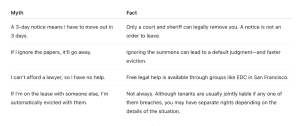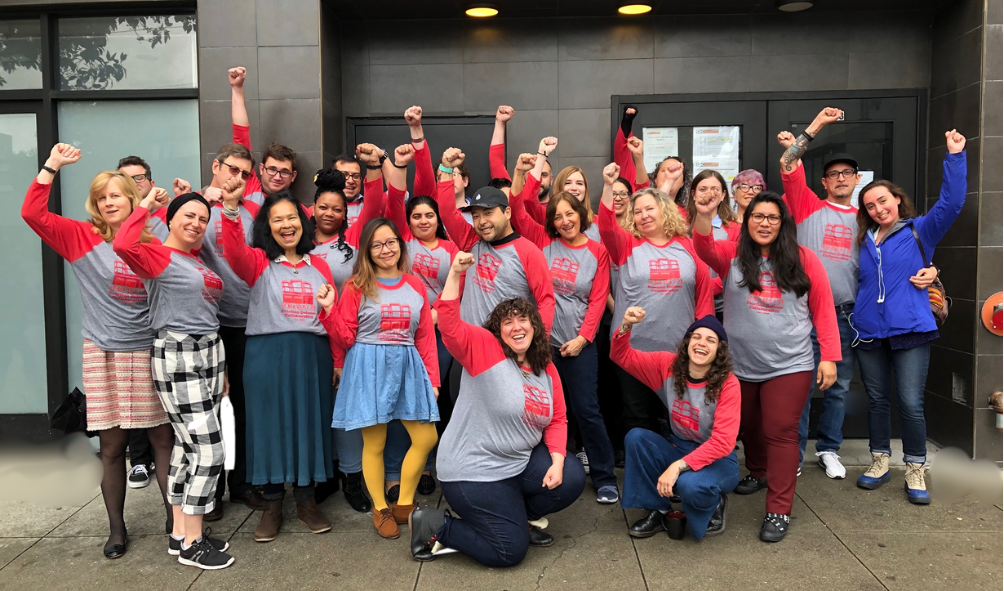Getting an eviction notice can feel overwhelming, but take a deep breath. You’re not alone, and you have rights.
Whether it’s a 3-day notice, a 30-day notice, or a formal Unlawful Detainer (UD) lawsuit, knowing what to do—and when—is key to protecting your home. In San Francisco, tenant protections are robust, and assistance is readily available. This guide walks you through the exact steps to take immediately after receiving an eviction notice.
What to Do After Receiving an Eviction Notice
Getting an eviction notice can feel overwhelming, but it doesn’t mean you have to move out immediately or that you’ve lost your home. In San Francisco, tenants have strong rights, and there are steps you can take right now to protect yourself, whether you’re unsure what your notice means or are already facing a court date. Here’s what to do next.
What to Do If You Need Help Right Now
If you’re in immediate crisis, such as unsafe conditions, harassment, or imminent eviction, contact one of the following:
- EDC Legal Help Line: (415) 659-9184
- SF 311: To access shelter or city crisis services
- 311 Mobile Crisis Team: Call 311 and ask for urgent mental health or housing support
- SF Rent Board: (415) 252-4600 – for rent control and tenant rights counseling
Don’t Panic—But Don’t Ignore It
The clock starts ticking the moment you receive an eviction notice, but ignoring it can make things worse. Acting quickly gives you the best chance of staying in your home.
There are different types of notices:
- Summons & Complaint / Unlawful Detainer (UD): This is the formal lawsuit—if you’ve received this, don’t wait. You usually have ten court days to file a response.
- 3-Day Notice to Pay or Quit: You must pay the rent due within three business days or risk further legal action.
- 3-Day Notice to Cure or Quit: Used for lease violations, such as unauthorized pets or guests.
- 3-Day Notice to Quit: Used for uncurable offences, such as nuisance or illegal acts.
- 30/60-Day Notice to Vacate: Typically used for no-fault evictions (e.g., owner move-in).
- Notice of Termination (for subsidized housing): May have additional rules.
If you’re unsure which notice you’ve received, bring it to our legal clinic or contact us immediately. We can help you understand your options.
You Don’t Have to Move Out Yet
Receiving a notice doesn’t mean you have to move out immediately. Only a sheriff’s eviction order—issued at the very end of the court process—can legally remove you.
Until then:
- You can remain in your home.
- You can respond legally.
- You may still be able to settle, pay back rent, or resolve the issue.
Know Your Rights as a San Francisco Tenant
San Francisco renters have some of the strongest tenant protections in the country. Here’s what that means:
- “Just Cause” Required: Landlords must have a legal reason to evict you.
- No Lockouts: Landlords cannot change your locks, shut off utilities, or remove your belongings without a court order.
- No Retaliation: You can’t be evicted just for reporting unsafe conditions or requesting repairs.
- Language Access: You have the right to translation help during legal proceedings.
If any of these rights are being violated, tell your legal advocate immediately.
Get Legal Help—Fast
If you’ve received a Summons & Complaint (Unlawful Detainer), you must respond within ten court days to avoid default. In San Francisco, free legal support is available for eligible tenants.
Contact us at:
- 976 Mission St., San Francisco
- Drop-in Hours: Mon, Tue, Wed, Fri
- 10:00–11:30 AM & 1:00–2:30 PM
- Legal Assistance: (415) 659-9184 | legal@evictiondefense.org
We help tenants respond to notices, represent themselves in court, and secure legal representation when possible. The earlier you reach out, the more options you have.
What Happens After You Respond to an Eviction Lawsuit?
Filing your response is a huge first step—but it’s not the end of the process. Here’s what to expect next:
- Discovery: This is a tool that enables parties involved in litigation to obtain information, thereby avoiding surprises at trial. Your landlord’s attorney may send you a list of questions they would like you to answer or documents they require you to produce. You must provide timely responses to discovery requests to preserve your defenses for trial.
- Settlement Conference: All cases in which a jury has been requested are assigned to a mandatory judicial settlement conference, where both parties can negotiate a possible resolution before trial.
- Trial: If no agreement is reached, your case will go to trial. This can happen quickly, often within a matter of weeks. Having legal support during this stage is crucial.
Tip: If you’re working with a legal aid organization like ours, your advocate will help you prepare for each of these stages and may appear in court with or for you.
Negotiating With Your Landlord: What’s Possible and When to Try
You may still be able to avoid eviction by talking with your landlord, even after receiving a notice or being served with court papers.
Situations where negotiation might help:
- You can catch up on back rent with help from rental assistance.
- You’re open to moving out with more time (a “move-out agreement”).
- You want to avoid a formal eviction record by settling the case.
If you’re considering negotiation, do it in writing whenever possible. Having a legal advocate can help you protect your rights during this process.
Check If You Qualify for Rental Assistance
If your eviction notice is for nonpayment of rent, you may be eligible for emergency rental assistance. This support can sometimes stop the eviction altogether.
Contact us at:
- 976 Mission St., San Francisco
- Drop-in Hours: Mon, Tue, Wed, Fri
- 10:00–11:30 AM & 1:00–2:30 PM
- RADCo (Rental Assistance at EDC): edcradco@evictiondefense.org
Even if you can’t pay the full amount, showing good faith efforts may help your legal case or lead to a payment plan.
Respond to the Court (If You’ve Been Sued)
If you receive court documents (a Summons and Complaint), you must file a written response at the courthouse within ten court days. This is referred to as filing an “Answer.”
- Our legal team can assist you in completing and filing this paperwork.
- If you don’t respond in time, your landlord may win the case by default, and the eviction process will move forward much faster without you having any opportunity to present defenses.
Missed the Deadline? What You Can Still Do to Stay Housed
If you didn’t respond to the eviction paperwork within ten business days, the landlord can request a default judgment from the court, which allows them to proceed with the eviction. But you still have options.
- Motion to Vacate (MTV): You can ask the court to reopen the case and explain why you missed the deadline.
- Stay of Eviction: If you’ve already received a Sheriff’s Notice to Vacate, a legal advocate can help request more time. The San Francisco courts will generally grant you one additional week, on condition that you are able to deposit one week’s rent into court.
Act fast—these legal tools are time-sensitive and require urgent action. Our team has experience filing emergency motions and helping tenants delay or stop eviction when possible.
Eviction Notices in Subsidized Housing: What You Need to Know
If you live in public housing, have a Section 8 voucher, or are in supportive housing, your eviction notice may differ, and the rules may be stricter for landlords.
Key protections:
- You must receive written notice with specific information and time to respond.
- Landlords must follow both local and federal regulations when trying to evict.
- You often have the right to a grievance hearing before court action begins.
If you’re unsure whether your housing is subsidized, consider contacting a legal aid group, such as EDC, for assistance. We can confirm what rules apply to your unit and help protect your rights.
Eviction for a Roommate’s Behavior: What Are Your Rights?
If your roommate violated the lease or caused problems with the landlord, you might still get an eviction notice, even if you had nothing to do with it.
You still have options:
- Try to separate your lease or tenancy rights. You may be able to stay if the landlord is willing to remove only the problem tenant.
- Respond to the eviction notice with your own defense. Explain your role and show that you followed the lease terms.
- Seek legal help. Advocates can argue that you should not be held responsible for someone else’s actions.
In shared housing, communication and legal guidance are key. Don’t assume you have to leave just because your roommate made a mistake.
Myth vs. Fact: Know What’s True About Eviction
Let’s clear up some common myths that can cause unnecessary panic:
If you’re unsure, don’t guess—reach out for help. Misinformation is one of the biggest risks during eviction.
Do I have to leave in three days if I receive a three-day notice?
No. You have three business days to pay or “cure” the issue—but even if you don’t, the landlord must still take you to court to evict you.
What happens if I ignore an eviction notice?
The process can escalate. You may lose your case by default, and a sheriff’s eviction could happen much sooner.
Will applying for rental assistance delay my eviction?
Sometimes. If funding is approved quickly, it can stop or delay a case, but timing is critical. Apply as soon as possible.
Can I still get help after a UD has been filed?
Yes! If you’re within the ten-day response window, legal organizations like EDC can still assist you in filing an answer and defending your case.
Final Thoughts: You Have Options
Being served with an eviction notice is stressful, but it doesn’t mean you’re out of time or out of hope.
There are steps you can take to stay housed. With the proper legal assistance, rental support, and community resources, many tenants in San Francisco can resolve their cases, avoid displacement, and safeguard their futures.
Need Help? Contact EDC Today
We provide free legal help and emergency rental assistance to San Francisco tenants.
- 976 Mission St., San Francisco, CA 94103
- Drop-In Hours: Mon, Tue, Wed, Fri – 10–11:30 AM & 1–2:30 PM
- Legal Help: (415) 659-9184 | legal@evictiondefense.org
- Rental Help: edcradco@evictiondefense.org
Don’t wait until it’s too late. Reach out now—because you deserve to feel secure and supported in your home.





